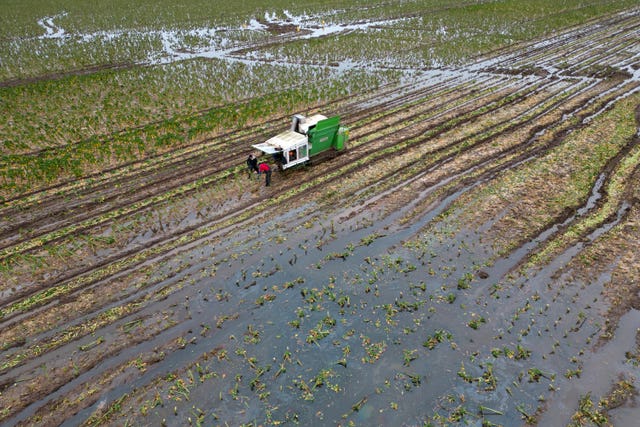Farmer confidence at all-time low as 82% hit by wet weather, unions warn
The National Farmers Union said farmers have been hit by ‘the perfect storm of events coming together’.

Farmer confidence in England and Wales has collapsed to an all-time low with more than four-fifths saying they have been negatively affected by months of wet weather, sector leaders have warned.
All areas of farming – arable, livestock, poultry, horticulture and dairy – expect to decrease production over the next year, a poll by the National Farmers Union (NFU) found.
Almost 800 farmer and grower members were surveyed between November 21 and January 5 about the challenges they are facing and their expectations for the year ahead.
The results published on Monday showed both short and mid-term confidence – farmers’ outlook on the next year and next three years – to be at their lowest levels since the annual research began in 2010.
Arable and livestock farmers were found to be particularly pessimistic towards both.
Relentless wet conditions in autumn played a big part, according to the NFU, with 82% of survey respondents saying their farm businesses suffered negative impacts.
But since January, heavy rain and storms continued to batter the UK through to April, meaning results would likely be worse if the survey were taken today.
Tom Bradshaw, NFU president, said the extreme weather was part of “the perfect storm of events coming together”.
“I don’t think anyone can underestimate the impact that this last 18 months of exceptional weather has had,” he said.

The conditions have compounded other problems for English and Welsh farmers, such as increased costs, inflationary pressures, labour shortages and cheaper imports, he said.
Results of the survey suggest that the highest proportion of farmers see the phase-out of the old EU Basic Payment Scheme towards new subsidy schemes as an issue that will negatively impact their businesses in 2024.
Closely following in second was the issue of high input costs like fuel and fertiliser, which ranked highest in last year’s survey.
Meanwhile, concerns over farmgate prices – what farmers are paid for their produce before transport costs – jumped by 10 percentage points this year.
The NFU warned that ultimately many farm businesses are at risk this year, citing Office for National Statistics figures that more than 8,000 farms have been lost between 2019 and 2023.
Its survey found that 65% of farmers said their profits are declining or their business may not survive, compared to 50% last year.
“Confidence has collapsed after months of devastating flooding, unsustainably high production costs and low market returns, and against a backdrop of reduced farm support as we transition to a new Domestic Agriculture Policy and associated farm support,” Mr Bradshaw said.
“Any business owner knows that without confidence and a steady cash flow, that business will struggle to re-invest and remain viable.”
Experts have recently warned that lower yields from key crops could lead to higher food prices if the losses cannot be offset by imports from a stronger global commodities market.
But Mr Bradshaw argued that relying on imports is “naive at best and foolish at worst” as climate change grows as a risk to food systems globally.
“Britain cannot afford to lose its ability to feed itself,” he said.
In its general election manifesto, the union outlined solutions for political parties to adopt to tackle the breakdown in farmer confidence and safeguard homegrown food production.
These include rewarding farmers fairly for their role in mitigating flood risk, transitioning smoothly to new environmental schemes that are open to all farmers and ensuring profitable long-term, food-producing businesses.
The union is also calling on politicians to establish minimum standards to promote fair and functioning supply chains and establish core production standards that apply to agri-food imports.
Mr Bradshaw said: “Farmers are carrying the risk within the supply chain and with the huge volatility we’ve seen in the input markets and in output prices in recent years.
“That risk is just getting too high for many businesses to take and we now need some solid foundations put in place that are going to underpin our food production for the future.”
Asked about voting sentiment among his members, he said the rural vote is “still very much up for grabs”, adding that the demographic is looking for policies that are going to underpin profitable food production.
Farming minister Mark Spencer said: “I pay tribute to all our farmers and their hard work to put food on our tables, day in day out.
“Backing British farmers remains at the heart of this Government’s approach, from maintaining the £2.4 billion annual budget, ensuring fairness in our supply chains and launching the largest ever grant offer for farmers in 2024.
“Our farmers have faced one of the wettest periods on record in England, and I have seen first-hand the impact this has had.
“The Farming Recovery Fund is offering support to farmers to help recover from uninsurable damage and we are looking at how we can expand the scheme and improve support for those affected.
“I will continue to listen and work with farmers to look at what further support can be offered during this challenging period.”





